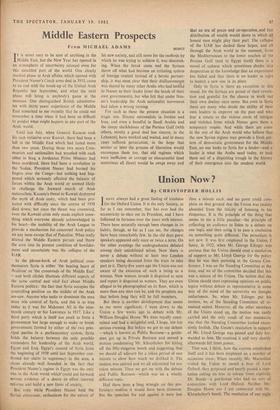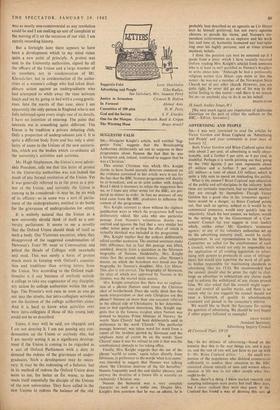Union Now?
By CHRISTOPHER HOLLIS I HAVE always had a great feeling of kindness I for the Oxford Union. It is the only Society, as far as I can remember, that has ever had the eccentricity to elect me its President, and I have followed its fortunes over the Years with interest. There have naturally enough been changes in its habits, though, as far as I can see, the changes have been remarkably few. In the old days guest speakers appeared only once or twice a term. On the other evenings the undergraduates debated among their uninhibited selves. Now there is never a debate without at least two London speakers being decanted from the train to take part in it. Thirty-five years ago the Union was not aware of the existence of such a being as a woman. Now women invade it disguised as men and report it disguised as women. They are even alleged to be photographed on, its floor, which is more than any man can be, and the prophets say that before long they will be full members.
But there is another development that seems to me more significant. I went down to the Union a few weeks ago to debate with Mr. William Douglas Home. We were royally enter- tained and had a delightful and, I hope, not too serious evening. But before we got to our debate —which is known as Public Business—a gentle- man got up in Private Business and moved a motion condemning Mr. Khrushchev for letting off the fifty-megaton bomb and suggesting that we should all adjourn for a token period of one minute to show how much we disliked it. The motion was carried and we all adjourned for our token minute. Then we got on with the debate and Public Business—which was on a wholly different topic.
Had there been a long wrangle on this pre- liminary motion it would have been tiresome. But the speeches for and against it were less than a minute each, and no guest could com- plain on that ground that the Union was unduly absented from the felicity of listening to his eloquence. It is the principle of the thing that seems to me a little peculiar—the principle of collecting an audience to listen to a debate on one topic and then using it to pass a resolution on something quite different. The procedure is not new. It was first employed in the Union, I fancy, in 1922, when Mr. George Edinger was anxious that the Union should send a resolution of support to Mr. Lloyd George for the policy that he was then pursuing at the Genoa Con- ference. I was on the Standing Committee at the time, and we of the committee decided that this was a misuse of the Union. The notion that the Union should start expressing opinions on public topics without debate as representative in some way of the mind of the university we thought unfortunate. So, when Mr. Edinger put his motion, we of the Standing Committee all re- mained seated. However, all the other members of the Union stood up, the motion was easily carried and the only result of our manoeuvre was that the Standing Committee looked exces- sively foolish. The Union's resolution in support of Mr. Lloyd George was passed and duly for- warded to him. He received it and very shortly afterwards fell from power.
That was, I think, how the custom established itself and it has been employed on a number of occasions since. When recently Mr. Macmillan visited the Union to unveil a bust of Lord Oxford, they proposed and nearly passed a reso- lution calling on him to release from captivity Dr. Banda—a gentleman who had no sort of connection with Lord Oxford. Neither Mr. Douglas Home nor I am connected with Mr. Khrushchev's bomb. The resolution of our night Was as nearly non-controversial as any resolution could be and I am making no sort of complaint at the moving of it on the occasion of our visit. I am merely recording history.
But a fortnight later there appears to have been a development which to my mind raises quite a new point of principle. A protest was sent to the University authorities, signed by all the officers of the Union and a large number of its members, not in condemnation of Mr. Khrushchev, but in condemnation of the autho- rities of a women's college who had taken disci- plinary action against an undergraduette who had attempted to while away the time between lunch and tea by going to bed with a young gentle- man. Into the merits of that case, since I am apparently the only person in England who is not fully informed upon every single one of its details, I have no intention of entering. The point that interests me is something quite different. The Union is by tradition a private debating club. Only a proportion of undergraduates join it. It is quite a different body from and has only a simi- larity of name to the Unions of the new universi- ties, which are the bodies which co-ordinate all the university's activities and societies.
Mr. Hugh Stephenson, the Union's most admir- able President, tells me that this letter of protest to the University authorities was not indeed the result of any formal resolution of the Union. Yet it was generally referred to in the press as a pro- test of the Union, and certainly the Union is coming to be considered—it may be, by no wish of its officers—as in some way a sort of parlia- ment of the undergraduates, entitled to do battle for the grievances of undergraduates (or -ettes).
It is entirely natural that the Union at a new university should think of itself as a uni- versity parliament. It seems to me a novelty that the Oxford Union should think of itself as such a body. Our Victorian ancestors, when they disapproved of the suggested condemnation of Newman's Tract 90, went to Convocation and pelted the Heads of Colleges with snowballs and mud. This was surely a form of protest much more in keeping with Oxford's constitu- tion and traditions than writing letters from the Union. Nor according to the Oxford tradi- tionalist is it any business of anybody outside a college to take any cognisance of any disciplin- ary action by college authorities within the col- lege. The Proctor's writ runs as soon as you go out into the streets, but intra-collegiate activities are the business of the college authorities alone. And it is hard to know what activities ever were intra-collegiate if those of this young lady could not be so described.
Times, it may well be said, are chgnged, and I am not denying it. I am not passing any con- demnation on the Union or anybody else, but I am merely noting it as a significant develop- ment if the Union is coming to be regarded as a sort of Oxford Parliament with a duty to demand the redress of the grievances of under- graduates. Such a development may be neces- sary. It may be the redressing of a balance, but in its method of redress the Oxford Union does seem to me, for better or for worse, to have made itself essentially the disciple of the Unions of the new universities. They have called in the new Unions to redress the balance of the old.



































 Previous page
Previous page